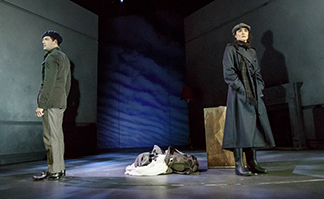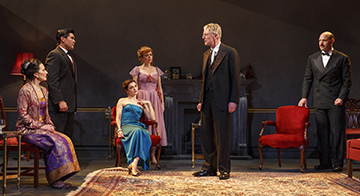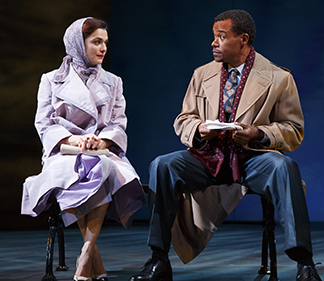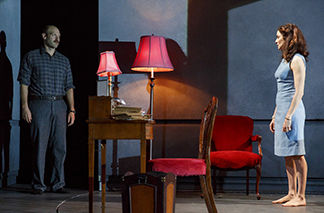By Lucy Komisar
Is David Hare‘s play “Plenty” about the personal or the political? A confusing muddle.
We first see our heroine Susan (the very fine Rachel Weisz) at 17 in occupied France where her job is to work with other resistance fighters to divert Germans from the front. In a black cap and trench coat, she is waiting for a drop.

But an unexpected “drop” is Codename Lazar (Ken Barnett), a British pilot who has bailed out. She weeps to him about how she is replacing an agent who was captured and taken to Buchenwald. Then the war ends.
Hare says that he wrote the play because he felt that “women‘s experience was missing from accounts of the official history” of the post-World War II years. And he points out that the marriages of 75% of the female wartime special operations agents had ended in divorce – that it was “hard for them to settle back into civilian life.” He is known as a political playwright, so you might expect a political commentary on the status of women.
You might have expected he would say the courage required by the behind-the-lines exploit made them unable to accept routine sexism. Except that is not at all what Hare‘s disappointing play shows.
In his revival of the work that David Leveaux directed in 1982 (first presented in London in 1978), the director does as well as he can with a muddled text. Events are presented naturalistically on Mike Britton‘s effective black box stage.
The title “Plenty” refers to the idea that the post-war would lead to “Peace and Plenty.” Of course, it didn‘t. It never has. But that was a political choice by the elites, something Hare barely touches on. (That‘s why it never has.) Susan takes office jobs and at first seems to like them. Women working at low-level jobs will not change the system.

Skipping ahead, the most interesting part of the play comes at the end of the first act, when our heroine Susan is a diplomat‘s wife hosting his Foreign Office boss, Leonard Darwin (the always authentic Byron Jennings) and a Burmese envoy and his wife.
It‘s 1956, and the British and French have just invaded Suez. The Foreign Office has issued a statement that the Brits, purportedly neutral, call on the Israelis to move away from a point which in fact they had not reached. But it was in the plan. They are caught in a lie, in their political corruption. She is drunk. She goads Darwin, telling him that the Brits are now an international laughing stock. She predicts the death rattle of the ruling class.
Surprisingly, Darwin, who had seemed the compleat foreign office bureaucrat, says “I was lied to. The government lied to me. I would have been defending it had it been honestly done.” Turns out that Darwin had been against such a move and resented not that it happened but that he had been lied to by the Foreign Office. It calls up one of Hare‘s best plays, “Stuff Happens,” about the lies told by the G.W. Bush administration to entangle the U.S. in the still on-going Iraq War.
Susan‘s husband Brock says PM Anthony Eden is weak. That “They taunted him…. [he thought] I must find something to be strong or …he finds Nasser. They were probably drafting telegrams. They do before they drop bombs. Bad conscience.” A smart if cynical analysis of how the “smart-dumb” foreign policy wonks get the rest of us into war. And some into body bags. But forget that, it‘s not about them.
Susan offers the Burmese couple claret from the cellar, there is “plenty.” Plenty of stuff, but not peace. In her elegant blue gown, she cries over horrors of war. Swears. Predicts we will at last see some changes.

But the rest of the play before and after that high point is a series of erratic events as Susan sinks into neurotic acting out. The pills she gulps down don‘t help. She is dissatisfied with a job advertising “cardboard” as shoes.
She wants to have a child but no husband, so she persuades Mick (LeRoy McClain) to impregnate her. He is a black Cockney – obviously setting his class against hers – but it unclear whether his part represents untraditional casting or she was planning to have a black child, something never mentioned in the dialogue.
She marries diplomat Raymond Brock (Corey Stoll), who we will see in the Suez event, a rather sad sack of a fellow who is in love with her and lets himself be ill-treated by her for the ensuing 15 years. Maybe he got used to that in the diplomatic corps. But he can‘t hack it for promotion at the Foreign Office, not because he isn‘t smart enough (an FO personnel officer explains, “It‘s not enough to be clever, more important is attitude of mind”). Being gracious and sociable is valued more than being right or wrong. A profession in which nobody may speak their minds: “it‘s called diplomacy.

Along the way Susan makes a friend of Alice Park (Emily Bergl), who is on relatively solid ground as a high school teacher of girls who are either very rich or congenitally stupid. Her student Dorcas (Liesel Allen-Yeagar) 17, comes looking for cash because she stupidly got herself pregnant by using sex to pay for drugs. It‘s the same age Susan was in occupied France.
And Louise (a very good Dani de Waal), is a self-described bohemian who we see painting a nude women brown and green – brown from feet to waist, then green, so she will go to a New Year‘s Eve Arts Ball as an oak tree. All of this may represent a society that is cracking up as much as the often hysterical Susan is. Is she looking for the return of simple heroism? To a life in an occupied place fighting for liberation? Or distraught at the corrupt post-war society she inhabits? Not clear. And neither is the play.
Plenty.” Written by David Hare, directed by David Leveaux. The Public Theater, 425 Lafayette St., (south of 8th Street) NYC. 212-539-8500. Opened Oct 20, 2016, closes Dec 1, 2016. 10/30/16.

